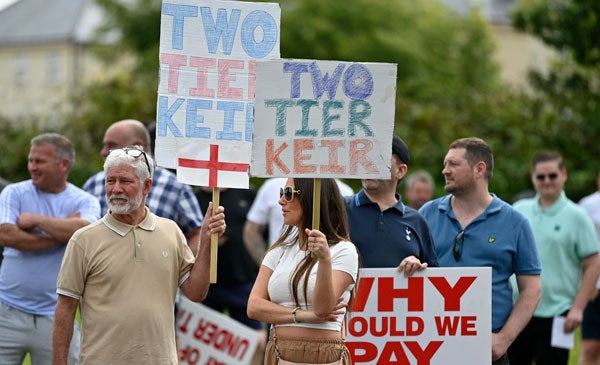All repressive and authoritarian regimes, from Caracas to Pyongyang, suppress speech. Rulers like Russia’s Vladimir Putin or China’s Xi Jinping cannot tolerate truth, as it can threaten their hold on power.
Today, free speech is under attack even in the “free” world, and those attacks are undermining democracy at its core. An informed electorate will not always make good decisions, but an uninformed electorate is much easier to manipulate into making bad ones.
Western “progressives” see their desired progress as threatened by “mis”- or “dis”-information, which is speech they consider false or motivated by malice. They consider suppression of that kind of speech to be allowable. Gov. Tim Walz of Minnesota summed up that attitude in 2022 when he said, “There’s no guarantee to free speech on misinformation or hate speech.”
The Daily Signal depends on the support of readers like you. Donate now
But there is. Under our Constitution’s First Amendment, Americans have the freedom to speak the truth or voice their opinions. The price society pays for that freedom is that people can also speak garbage and share reprehensible opinions, but it’s worth it. (Many defended Walz, with one website claiming the clip was “heavily edited” and “out of context,” but he said what he said.)
On the immigration debate, as with other contentious issues, the legacy media has torched its credibility over the past decade through obvious bias and partisanship. The simultaneous explosion of alternative media has created a diversity of news sources and unlimited information. How the media frames and presents the facts is now as important as the facts themselves, a weakness which those in power exploit.
The Western liberal elite and its allied media believe that mass immigration from the Third World into the First is both inevitable and good. To suppress criticism of this orthodoxy, they conflate reasonable opinions they disagree with—for instance, that immigration levels are too high—with criminal conduct, such as calling for migrants to be assaulted.
Legitimate and verifiable observations, for instance, that asylum fraud is widespread, that housing asylum claimants is expensive, or that crime is higher in certain areas heavily populated by migrants, are tarred as hate speech to delegitimize these views.
But if we are to debate immigration or any other national policy issue, we must maintain a distinction between free speech—including obnoxious or even hateful sentiments—and conduct that is unlawful.
In Britain, recently shaken by public unrest in the wake of the murder of three children, we see how fine a line that can be.
In late July, three little girls were killed by a 17-year-old in Southport, England. The assailant turned out to be a British-born child of Rwandan parents, but false rumors about his identity and origin sparked protests, counterprotests, riots, and mayhem across several towns.
The Southport stabbings obviously tapped into a wide range of public antipathy in the United Kingdom about the country’s immigration levels, which have continued at an unprecedented scale despite the “Brexit” vote to leave the European Union. Net migration to the U.K. in 2023 was 685,000, or 1% of the population that year alone. The asylum system is swamped.
At the extreme end, there is a small percentage of those willing to commit violence. But the bulk of people opposing mass immigration or the costs of spiraling asylum claims are simply expressing a political opinion.
In Britain, under an insecure new Labour Party government and prime minister, it seems that the Crown Prosecution Service is throwing the book at anyone involved in counter-immigration protests. British police and the Crown Prosecution Service want to be seen cracking down hard not just on violence but on any anti-immigration speech and sentiment. They are not only prosecuting people who physically attended demonstrations and committed violent acts but are also finding and prosecuting “armchair warriors” who post on social media.
Some offenses seem pretty clear. During the unrest, one 53-year-old Englishwoman wrote on Facebook, “Don’t protect the mosques. Blow the mosque up with the adults in it.” She received a 15-month sentence for “sending a communication to convey a threat of death or serious harm.”
In another instance, a 20-month sentence was given to Jordan Parlour for “publishing threatening, insulting or abusive material to stir up racial hatred.” He had posted to Facebook that “every man and his dog should smash [the] f— out of Britannia hotel,” where the government was housing asylum applicants.
Some of the nonviolent offenses prosecuted in the U.K. are more arbitrary.
Jordan Plain, aged 30, got eight months for actions during one protest that mocked people’s race and religion. His behavior was clearly obnoxious and disgraceful, and as the judge said, “grossly offensive.” But the crime he was charged with was that his actions “caused alarm and distress to others.” Under Britain’s Public Order Act, causing “harassment, alarm, or distress” to anyone can get you a fine, and if it is “intentional,” it can be a crime punishable by up to 26 weeks in jail.
Britain’s Public Order Act is a broad and powerful tool, wielded at the wide discretion of the Crown Prosecution Service and interpreted by judges. Some have argued that, when it comes to violent unrest, the British police and prosecutors apply a tougher standard on indigenous offenders than on those from immigrant backgrounds.
Accusations of such “two-tiered policing” are fiercely denied by the government and its apologists, but videos on social media have shown police tolerating conduct by mobs of pro-Palestine demonstrators that arguably violates the Public Order Act.

The U.S. also has laws that can be used to target conduct (or people) the government disapproves of. But unlike the British—in fact, because of them—we have the powerful protection of the First Amendment as a defense.
The Babylon Bee’s joke that “social media posts that will now get you arrested in Britain” rings true. And censorship is growing with our North American neighbors, too. In Mexico, a politician was criminally convicted of “gender-based political violence” for calling a colleague a “man who self-ascribes as a woman.” And Canada’s Online Harms bill has the laudable goals of preventing the sharing of private material without consent and protecting children, but it could also be used to interpret “hateful” content in ways that favor the ruling party.
Immigration is one of the top concerns for American voters this November. Rhetoric will intensify, as with any subject people care about. Political ads will do the truth little justice. The American ruling class needs to keep its cool and trust our people to handle free speech.
Yes, it is risky, but the alternative—content regulation by the government in collusion with unelected bureaucrats and self-appointed experts—is worse.
The BorderLine is a weekly Daily Signal feature examining everything from the unprecedented illegal immigration crisis at the border to immigration’s impact on cities and states throughout the land. We will also shed light on other critical border-related issues such as human trafficking, drug smuggling, terrorism, and more.
Read Other BorderLine Columns:
NJ Town Prioritizes Protecting Illegal Aliens From ICE Over Public Safety
A Successful US Immigration Policy Would Send Venezuelans Home to Rebuild
Here’s the Chart on Illegal Immigration That Trump Was Talking About When Shot
How Noncitizens Get to Vote in US Elections and How to Stop It




























